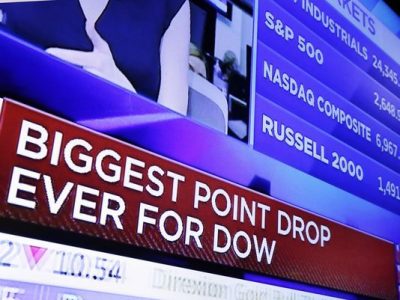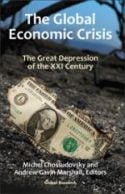Plummeting Stock Markets: The Dow in “Correction Mode”

VISIT MY NEW WEB SITE:
Contact at [email protected].
At Thursday’s close, it was down 10% from its all-time high.
On Tuesday, longtime market analyst Art Cashin told CNBC:
“I’ve been on Wall Street for 50 years and this looks like a market bottom.”
His attempt and others to reverse declining equity prices failed, the Dow plummeting another 1,032 points on Thursday after two days of sharp increases.
Short-term trading up or down on Wall Street and elsewhere doesn’t indicate a trend.
Yet a tsunami of liquidity courtesy of Fed quantitative easing, other key central banks following suit, along with near-zero interest rates, let bulls have things their way for the past nine years – not a record bull market but close.
Former Nixon Council of Economic Advisors chairman Herb Stein once said “if something cannot go on forever, it will stop” – another way of saying things that can’t go on forever won’t.
Has a Waterloo moment arrived for the aging bull market? It’s too soon to know, but clear if not now, it’s coming. Equities are hugely overvalued. They can’t keep rising exponentially.
On January 3, noted market analyst Jeremy Grantham said
“(b)rac(e) yourself for a possible near-term melt-up or end-phase of a bubble within the next 6 months to 2 years.”
Equity valuations rose sharply in the new year before swooning in late January. On January 26, the S&P 500 closed at 2,872.87 – since then declining 292 points (over 10%).
European, Asian and most other markets follow Wall Street. Absent volatility is back with a vengeance. Whether the bull market ended or continues, sharp market swings are likely to continue as long as uncertainty replaced complacency.
Buy the dip worked for years. Doing it now perhaps entails greater risk than many investors wish to take.
Since last weekend, professional investors began dumping Exchange Traded Funds, an ominous market sign if continues.
China’s currency dropped sharply, anticipating possible financial instability. European banks are holding around $2 trillion in non-performing loans.
Australian economist Steve Keen believes investors are asking the wrong question, wondering if recent trading days reflected a market crash.
The real one is “why did it take so long for this crash to happen,” he believes, adding market turbulence is “like a long-overdue earthquake.”
“(T)he ratio of stock prices to corporate earnings is almost higher than it has ever been.”
It’s only been higher during the dot.com bubble.
The crash saw Nasdaq valuations declining over 75%. Is a repeat coming, along with crashing Dow, S&P valuations, and similar declines in other markets, emerging ones likely hit hardest if bears replaced bulls on exchanges.
Keen calls the current market bubble the first central bank-created one. He thinks the Fed and other central banks will intervene with more quantitative easing, trying to “drive shares back to what think are ‘normal’ levels, but which are at least twice what they should be.”
If so, it will continue benefitting corporate predators and wealthy households at the expense of most others – the ongoing scheme since the neoliberal 90s, accelerating under Obama and Trump.
*
Stephen Lendman is a Research Associate of the CRG, Correspondent of Global Research based in Chicago.
VISIT MY NEW WEB SITE: stephenlendman.org (Home – Stephen Lendman). Contact at [email protected].
My newest book as editor and contributor is titled “Flashpoint in Ukraine: How the US Drive for Hegemony Risks WW III.”
http://www.claritypress.com/LendmanIII.html
The Global Economic Crisis
The Great Depression of the XXI Century
Global Research
Each of the authors in this timely collection digs beneath the gilded surface to reveal a complex web of deceit and media distortion which serves to conceal the workings of the global economic system and its devastating impacts on people’s lives.
In all major regions of the world, the economic recession is deep-seated, resulting in mass unemployment, the collapse of state social programs and the impoverishment of millions of people. The meltdown of financial markets was the result of  institutionalized fraud and financial manipulation.
institutionalized fraud and financial manipulation.
The economic crisis is accompanied by a worldwide process of militarization, a “war without borders” led by the U.S. and its NATO allies.
Click to order directly from Global Research
This book takes the reader through the corridors of the Federal Reserve, into the plush corporate boardrooms on Wall Street where far-reaching financial transactions are routinely undertaken.
“This important collection offers the reader a most comprehensive analysis of the various facets – especially the financial, social and military ramific ations – from an outstanding list of world-class social thinkers.”
ations – from an outstanding list of world-class social thinkers.”
-Mario Seccareccia, Professor of Economics, University of Ottawa
“In-depth investigations of the inner workings of the plutocracy in crisis, presented by some of our best politico-economic analysts. This book should help put to rest the hallucinations of ‘free market’ ideology.”
-Michael Parenti, author of God and His Demons and Contrary Notions
“Provides a very readable exposé of a global economic system, manipulated by a handful of extremely powerful economic actors for their own benefit, to enrich a few at the expense of an ever-growing majority.”
-David Ray Griffin, author of The New Pearl Harbor Revisited

